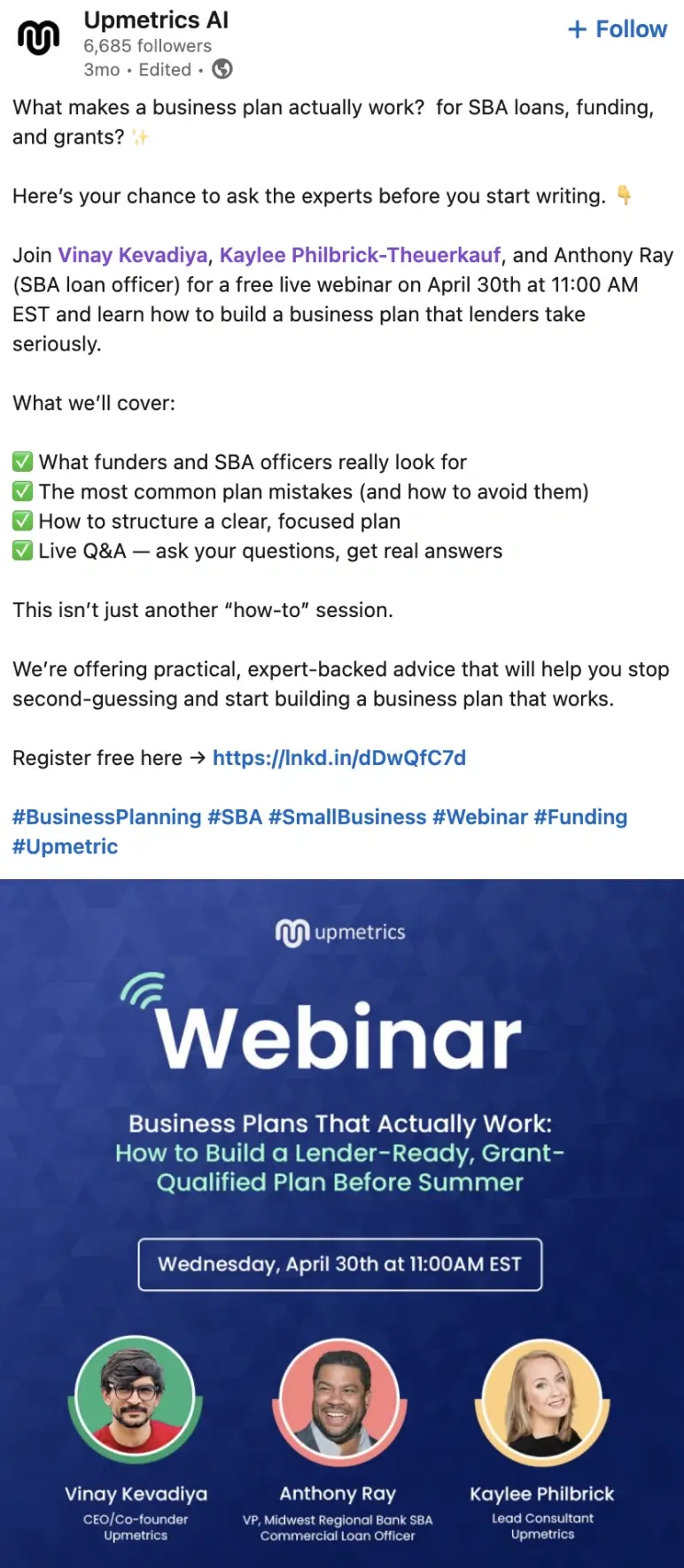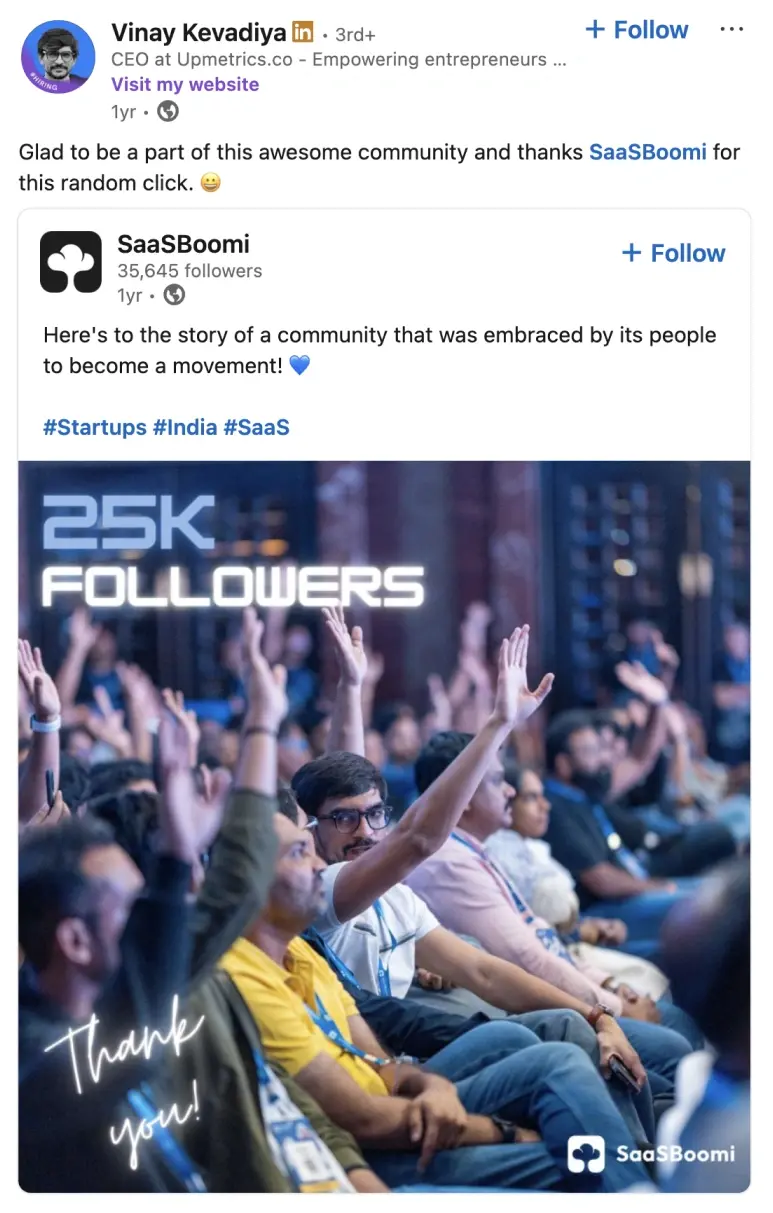You know what’s fascinating about reading business plans? You start spotting patterns. Some ideas pop up once in a while, but others… they just keep showing up, and for good reason, because they work.
Over the years, I’ve come across marketing tactics so simple yet so effective, they’ve turned small businesses into local favorites, boosted sales without burning budgets, and even created loyal customer communities.
The best part? These ideas aren’t just for big brands with endless resources—they work just as well (sometimes better) for small businesses that know how to execute them right.
So, I’ve pulled together 10 of the small business marketing ideas I’ve come across. Each one comes from real strategies I’ve seen in action, not just theory. Think of this as a shortcut; you skip the trial-and-error and go straight to what moves the needle.
Let’s explore.
10 Fresh marketing ideas for small businesses in 2026
I’ve read hundreds of business plans at Upmetrics, and one thing stands out: Even the best product needs smart marketing to succeed. While reviewing marketing slides, I’ve come across some brilliantly simple tactics that helped businesses stand out and grow. These aren’t just theories—they’re ideas that real businesses are already using with great results.
Here are 10 fresh marketing tips I’ve seen work for small businesses in 2026.
1) Partner with other small businesses
Don’t try to do everything alone. Your best growth might come from another business down the street. I’ve seen partnerships turn small shops into local favorites almost overnight.
Look for businesses that share your audience but aren’t competitors. And, believe me, such collaborations work wonders. Here’s a real-life example:

Starbucks teamed up with Spotify to give employees free Spotify Premium, a perk that boosted staff satisfaction while giving Spotify exposure to thousands of potential paying subscribers. For small businesses, the same principle works on a smaller scale: Partner in a way that benefits both customers and employees.
For example, if you sell handmade candles, team up with a florist to create a “home ambience” gift bundle. If you run a café, partner with a nearby bookstore for a “read & sip” offer. The more natural the pairing, the more customers will see it as a value, not a promotion.
Remember, a good partnership has three things:
- Same audience, different products
- A clear benefit for both sides
- An easy, low-cost setup
Start with one idea, keep it simple, and make sure both businesses promote it equally. Done right, partnerships turn other people’s customers into yours.
2) List your business in local directories
I’ve lost count of how many business plans talk about ‘reaching more customers’ but skip the easiest step. That is being visible where people are already looking.
I’ve seen cafés, salons, and repair shops double their walk-ins simply by showing up in the right local directories.
Think about it: When someone needs a plumber, café, or yoga class, they don’t scroll Instagram first; they Google it, check Maps, or browse a local listing site. If you’re missing from there, you’re invisible to ready-to-buy customers.
Start with Google Business Profile, it’s free, shows your business on Maps, and lets customers leave reviews. Then, explore city-specific platforms or niche directories (for example, a wellness clinic could join Zocdoc in the USA, or a bakery could be listed on Yelp, Yellow Pages, or Tripadvisor).
I’m not just talking about others here; I’ve done this myself. When we started Upmetrics, one of the simplest but most effective steps we took was adding our company to SaaS directories.
It didn’t cost anything, but it put us in front of people actively searching for business planning tools, and that early visibility brought us our first wave of paying customers.
3) Develop a small website (1-page)
Startups often underestimate the importance of having a website while launching their business.
They wait for the right time, or sometimes for extra funding, or the “perfect” design—meanwhile, potential customers are already searching for them online and finding… nothing.
Remember, waiting for the right time and design is wasting opportunities. Even a simple one-page website can make you visible, build credibility, and give customers a place to contact you.
A website isn’t just about putting a single page online—it’s a place that shows your customers:
- Who are you?
- What do you offer?
- Where are you located?
- How can people reach you?
Here’s a great one-page website example I found:

If you’ll notice, this one-page website clearly explains what Erik offers, who it’s for, and how to get started—all within a clean, focused layout.
Start with what you have, launch quickly, and improve as you grow. A basic site today is better than a perfect site “someday.”
4) Make use of social media
While reviewing hundreds of business plans, I’ve seen one common thread among the businesses that grow fast: They use social media with intention. They’re not just posting for the sake of it; they’re building awareness, creating trust, and staying in front of their audience.
I apply the same approach to my marketing. I don’t try to be on every platform or post every day, but when I do post, it’s to provide value, whether it’s a helpful resource, a customer success story, or insights that make people think.
All in need is social media tools that help me schedule posts, engage with my audience, and keep my marketing consistent without burning out.
Here are a few social media marketing ideas for small businesses that I like and often come across being used effectively while analyzing business plans.
- Sharing customer testimonials to build trust.
- Contesting polls or quizzes to spark engagement and conversations.
- Running ads on Facebook and Instagram.
For small businesses, the lesson is simple: Treat social media as a tool to start conversations and attract attention from the right people, not just as a place to dump updates.
5) Ads in local newspapers
This is one of those offline marketing ideas that businesses still budget for, and surprisingly, in many plans I’ve reviewed, it delivers better ROI than some digital channels.
Local papers still have a loyal readership, especially in smaller towns and close-knit neighborhoods. A single well-placed ad can drive steady traffic to a bakery, home service provider, or local tutor.
Surprisingly, print ads average about a 9% response rate, compared to roughly 1% for email, paid search, or social media.
The key is to keep it simple: A clear headline, a short offer, your contact details, and maybe a small photo. Then track results by asking new customers where they heard about you, and if the numbers make sense, repeat it.
6) Start the contest/discount/freebies
I’ve found this marketing tactic in many business plans during my reviews, often highlighted as a quick way to grab attention and bring in new customers.
To be honest, it’s the right approach in my opinion! Nothing excites customers like the words “free” or “win.” Such an approach not only brings sales but builds awareness, collects leads, and gets people talking about you.
We often use a similar approach. We host free webinars and programs to help entrepreneurs sharpen their business plans. Not only do they get value, but I get to connect with a fresh audience who might work with us later.

The key here is to keep the offer relevant and easy to participate in. Whether it’s a short giveaway, a discount code, or a free trial, you maximize reach without overcomplicating the process.
7) Partner with a local influencer
Going through hundreds of business plans, I’ve noticed something interesting—in food, retail, and even real estate, the smartest marketing slides often include local influencer partnerships. Not the big celebrity kind, but people your community already knows and trusts.
A café might invite a local food blogger for a tasting, a boutique might gift an outfit to a city fashion creator, or a property agent might co-host a live tour with a neighborhood content creator.
And the benefits they highlight in their business plans from these collaborations include:
- Brand reaches the right local audience
- Instant credibility through someone they already follow
- Engagement feels organic, not forced
Partnering with a local influencer is one of the most common marketing ideas for business currently.
8) Attend networking events
It’s one of the most common and successful marketing ideas I come across in businesses, and it’s becoming even more popular these days. Because networking is the lifeblood of startups today.
Think about it, you’re in a room with potential partners, customers, and even investors, all ready to talk business. It offers a wealth of opportunities, growth, and insights that help you scale your business in step with the market.
And, it’s true! I still remember being part of the SaaSBoomi event in Chennai, which helped me meet entrepreneurs and founders who became lifelong friends, and some of them still open doors for me today.
In fact, a few of my most effective marketing ideas, like referral partnerships and joint webinars, came directly from conversations I had at that event.

Remember, attending events doesn’t just spark new marketing ideas; it can also lead to better hiring opportunities, more sales, and overall business growth.
9) Organize a social event
Every now and then, a business plan surprises me with a marketing idea that actually makes me pause. One of my favorites? Hosting a social event.
Not a “corporate” networking dinner with stiff handshakes—but an event where your customers, prospects, and even curious locals gather around something fun and memorable.
They organize events where cafés throw open-mic nights, gyms host charity runs, and co-working spaces hold Friday mixers. In the marketing slides, these founders often highlight two big wins if this event is successful:
1) Deeper brand connection because people remember experiences, not ads.
2) Organic buzz when attendees share photos and posts, your reach multiplies without extra spend.
If you pull it off right, a single evening can do more for your visibility than months of online promotions.
10) Set up a customer referral program
Some of the smartest businesses in the plans I review aren’t just selling to customers—they’re turning those customers into their sales team.
A good referral program doesn’t just bring in leads; it brings in warm leads—people who already trust you because someone they trust vouched for you.
In one plan, a small home-cleaning service showed how a simple “refer a friend, get a free month” offer brought in more signups in a single week than their Facebook ads did in a month.
In one plan, a small home-cleaning service demonstrated how a simple “refer a friend, get a free month” offer generated more sign-ups in a single week than their Facebook ads did in a month. This was mentioned in their traction slide, along with the exact spike in new customers after launch.
That’s the power of referrals: They cut through the noise, work fast, and cost next to nothing compared to paid channels.
The bottom line
Small business marketing isn’t just a side task; it’s the lifeline that connects your brand to real customers. Without smart marketing, even the best products can go unnoticed.
In this post, we explored 10 small business marketing ideas drawn from analyzing 100+ business plans, sharing strategies that work, from local collaborations to referral programs and micro-influencer partnerships.
Each idea is grounded in real-world experience, providing practical ways to enhance visibility and engagement without wasting time or budget. If you’re planning your next marketing move, tools like Upmetrics can help you organize, track, and execute these ideas efficiently, keeping your strategy clear and actionable.
Take what resonates, experiment boldly, and watch your business grow. Good luck implementing these tips—you’ve got this!


